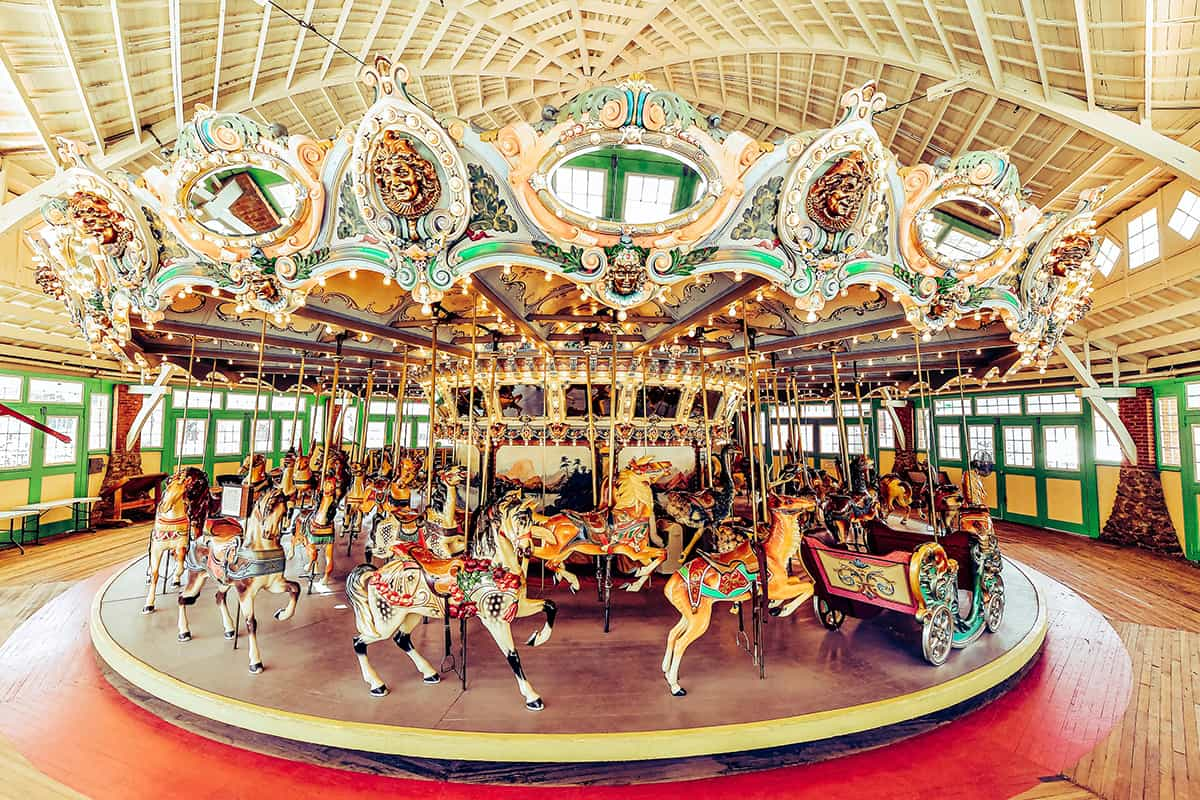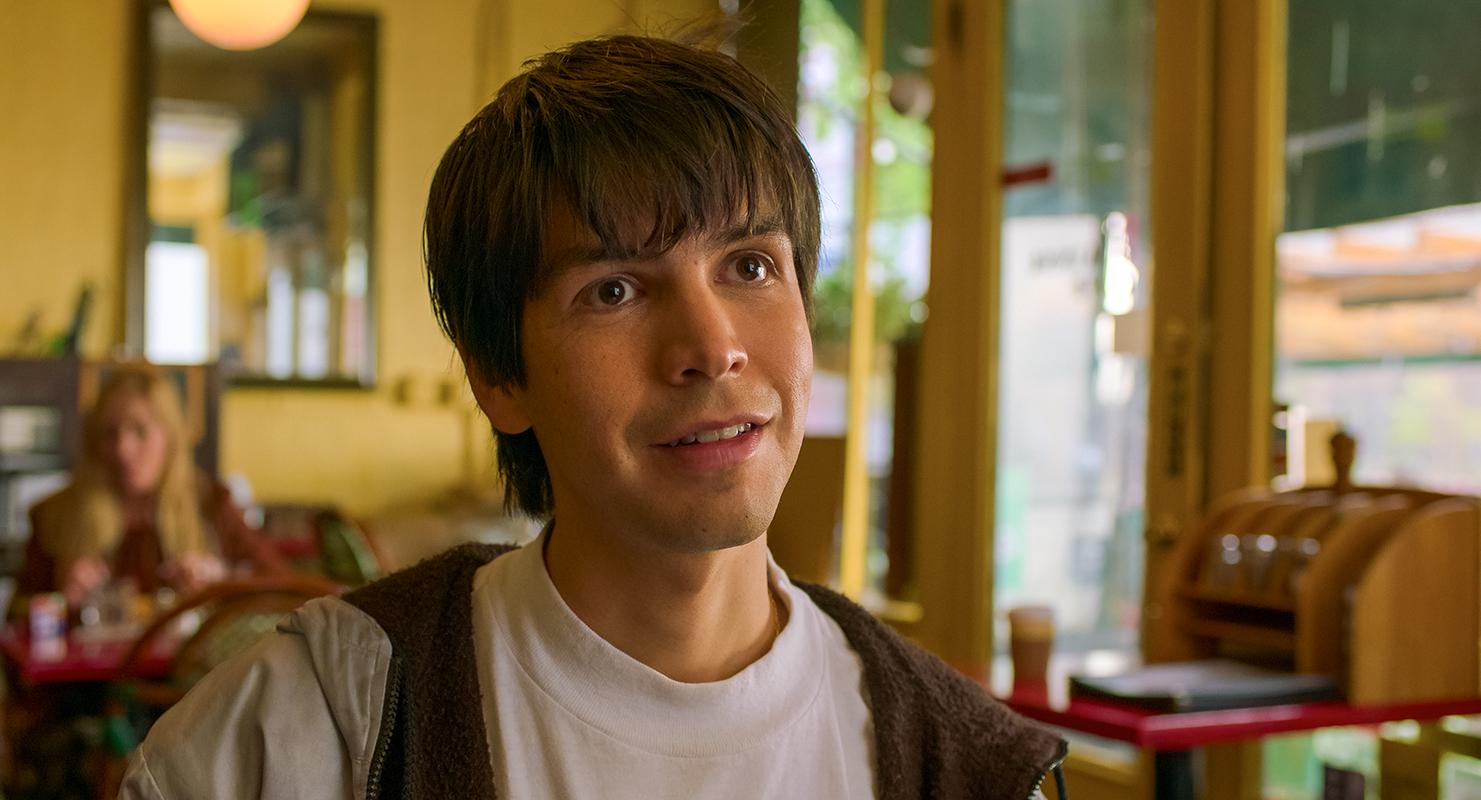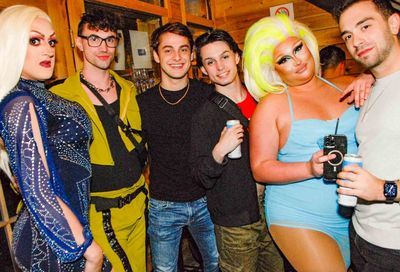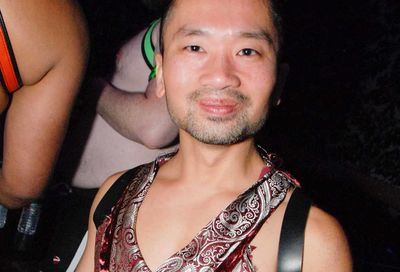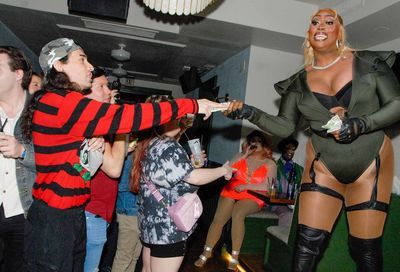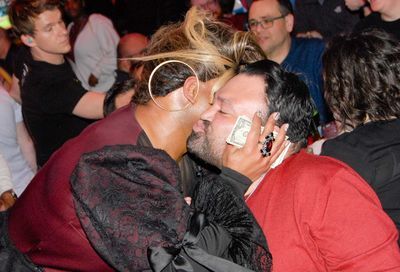Melissa Etheridge: Pot, Pops, and Politics
On the eve of her NSO debut, the rock legend wants you to know that everything is going to be okay. Eventually.

“I don’t care what they think,
I don’t care what they say,
What do they know about this love, anyway?”
When Melissa Etheridge penned “Come to My Window,” a potent, heartfelt rock ballad that would become one of her signature tunes, she was on the brink of coming out to the world. Sure, there had always been whispers and rumors about the fierce, uncompromising female rocker, but in 1993, the same year her album Yes I Am filled record store shelves, Etheridge finally answered the question posed by so many fans and journalists, confirming her sexuality at the Triangle Ball, an LGBTQ celebration of Bill Clinton’s inauguration.
Etheridge was, at the time, climbing the ladder of fame, yet she doesn’t consider her choice brave or bold. “I felt I was keeping a secret,” she says, plainly. “And I didn’t like secrets at all.”
The news made Etheridge an even bigger rock star, and she continued to sell out arenas for years to come, eventually scaling to more intimate settings, where her fans could be in full thrall of her eloquent, rich, detailed songwriting. Her unmistakable, improbably tender rasp carries within it a deep yearning and strong emotional undertow that propels not only her soaring rock epics, but brings expressive potency to quieter numbers like the stirring “Please Forgive Me” from 2001’s Skin.
This Friday and Saturday, Etheridge, who has played every style of venue, from massive arenas to intimate houses like The Birchmere, will appear at the Kennedy Center Concert Hall, making her debut with the NSO Pops, under the buoyant baton of Steven Reineke.
“I get chills when I hear ‘Come to My Window’ with the big brass and the strings,” she says, noting that the evening will not only celebrate her hits. “I actually go deeper into my [repertoire] on a set list with a symphony orchestra. Even if you’ve seen me this year — or seen me anytime — this is a different show. It is deep. It is drenching. And it is one of my favorite ways to perform my music. So I would encourage everyone to come and partake in the experience. It’s one of my favorite things I do. It’s really a blessing.”
Much has changed in the world since Etheridge, an outspoken champion for human rights, the environment, and LGBTQ equality first sat down for an in-depth interview with Metro Weekly in 2002. Chiefly, Trumpism has reared its ugly head, and our country has never seemed more politically — and dangerously — divided. Etheridge, however, is almost serenely optimistic about the current political climate, feeling that a better society will emerge from the current administration’s ruinous embers.
“I keep telling my children every day, ‘You are living a great moment in history, because this will change forever how we elect our officials, how we look at our elected officials, how we understand power,'” says the 57-year-old. “I have to believe that this will lead us to a great change in how we govern ourselves.”

METRO WEEKLY: You were raised in the heart of the midwest. How did growing up in Kansas shape the person that you are now?
MELISSA ETHERIDGE: So much of what I am on the inside comes from that Midwestern sensibility. I grew up in a comfortable home. It was lower middle class, and it was comfortable enough. Both my parents worked. I grew up in a place where you didn’t much talk about your emotions. Even though there might be things going on, big things brewing underneath, you just didn’t talk about them. You worked hard and played fair, and that was how you got along.
It enabled me to have huge dreams. It enabled me to really look at the television and the radio and think about music and that entertainment world that was all sparkly and glowy somewhere out there in New York or California. It enabled me to dream, and dream really large dreams. I’ve always taken the sense of “Okay, we work hard and play fair” with me. The part where there was no emotion — I put all that emotion into my music, and made that my craft.
MW: So many people stay rooted in the midwest and never leave. Was knowing you were gay a deciding factor for leaving?
ETHERIDGE: I think that became a lot of fuel for what I wanted to do and where I wanted to go. I think knowing that I couldn’t be free, who I wanted to be, or even knowing that there was more for me. Of course, I was the only gay person in my town. Then, there was just the fire of wanting more, wanting the excitement of the big city and just of life. Some people make where they are the place they want to be. But my drive was definitely to get to a big city and to discover everything I could.
MW: You came out publicly in 1993, but did you come out prior to that to your parents?
ETHERIDGE: Yes. When I was about 20 or 21 and was finally moving out to California. I came out to my father. I wasn’t quite talking to my mother until I was about 25, but then after that, it was fine. I was out. I was definitely a very out person in every way, except to the public. By the time I came out to the public, when I was 33, I’d been out to my friends and family for over ten years.
MW: What is it like to be a public figure, but to keep such a major part of your life a secret?
ETHERIDGE: Well, it was from ’88 to ’93, so it was five years. When my first album came out in ’88, I was unknown. It did well in the rock and roll world, I sold a million records, and I was fine. I had an underground following. I had a huge lesbian following — that was known — and a female following. There was very much of a don’t ask, don’t tell [vibe] over my career. I thought for sure after my third album, someone would ask me, and I would be able to move forward with it. By the time I was making my fourth album, I knew I wanted to come out, because my songs were personal. My fame was growing and I didn’t want to have this weird thing about me that I felt I was keeping secret. And I didn’t like secrets at all.
MW: Many of your early songs can be perceived as gender nonspecific. But often, when I listen to your work now, I feel a deeper personal connection because I feel they speak directly from a same-sex point of view.
ETHERIDGE: I think every listener has the capacity of making a song what they want. I do know that my overall story definitely gets transposed onto that, because it does come from that. My hope is that a person can make that story somehow reflect their own story, so it can be universal. A song like “Come to My Window” reaches a universal desire in all of us, even though you know specifically who I’m singing about.
MW: So many musicians never achieve the level of fame that you achieved. Were you surprised by your success?
ETHERIDGE: I wouldn’t say I was surprised. I would say that mine was a long slow burn. It was year after year of slowly starting in bars and clubs, and going to theaters. Then, by the mid-nineties, it was big arenas and stadiums. It has leveled out since and has been consistent. I didn’t have that one couple months where everything went crazy. It was the slow movement into it, and I’m grateful for that, because I have seen artist friends around me all of a sudden get massive success and it just blows them away, because it’s really intense for a while.
I just made my music. I enjoyed what I was doing. I was in the moment day after day after day. After 10 years, 20 years, 30 years you look back and go, “Oh, look what I did.” There was never an end point to this. The end point was that it just keep going. Success to me was that I would be able to still play my songs and music, make new music and just keep doing what I love. That was success.
MW: What is it like to have gone from playing massive arena crowds to more intimate, smaller spaces?
ETHERIDGE: There’s a certain detachment you have in an arena. You’re on a very big stage, way up high, and it’s a different sort of mindset in how you perform to 10,000 people, as opposed to 2,000. Two thousand, in an intimate setting, is very delightful. I can be relaxed. There’s more connection with people. Usually, they’re closer to the stage. There’s a real comfort in it. [Laughs.] Not that I’m going to turn down an arena if somebody wants me to play an arena….
MW: Let’s talk about your activism. LGBTQ issues are important to you, environmental issues are important to you. What was it that got you involved?
ETHERIDGE: Activism really showed up at my doorstep. I did not go looking for it. I just wanted to be a big ol’ famous rock star, and that was it. Then, my own personal choices really put me in that activist spotlight.
MW: Coming out.
ETHERIDGE: Yes, coming out and saying, “You know what? I agree to answer the questions. You, as reporters, can ask me questions and you can write the story.” Through that, I became an activist. Through that, I became a person that young LGBT people could see and say, “Oh, she’s like me.” That’s something that I didn’t have when I grew up. In just making my choice to come out and be truthful, I became an activist. And then, as I walked the walk and continued to agree to speak about it, the world just comes knocking at your door. Al Gore calls with An Inconvenient Truth, and it just makes sense, and then cancer comes and you have to deal with that, speaking truthfully about my experience. I found that some of the greatest activism is just actually a person being themselves. Having the courage to be who they are and help others by speaking about their journey.
MW: What is the most important issue to you right now?
ETHERIDGE: I wouldn’t say there’s one particular thing. What we’re going through right now is all connected. It’s all about fear, and fear of the other — whatever you might call it, whether it’s another person with different skin, or speaks a different language, or different love, or different ways of thinking. All of those are fears of the other, and so to me, it all comes under that.
The most important thing for us as a society is to understand fear and how it can make us make the choices that affect the world. There’s a big change happening, understanding that you can’t divide us anymore between men and women, or gay and straight, or skin color, or American or not. Those divisions don’t work anymore, and that’s very hard for a lot of people. I think that’s where we’re at.
MW: How much does the current administration concern you?
ETHERIDGE: It is of great concern. Yet, I believe it is creating the greatest change that we’ve ever seen, in that people who have maybe been comfortable in their lives and kind of just rolling along, it causes them to actually desire more community, to desire more cooperation, instead of competition, instead of division. It’s the type of administration that brings people to the streets and brings us together. You start to feel more of a community of humanity than we have had before — and I think that is ultimately good. Even though what we’re going through is incredibly painful and horrible — and I certainly wish we weren’t going through it — I believe it will bring about the greatest change we’ve seen in a hundred years.
MW: You genuinely think good will come out of what President Trump and his administration is putting us through?
ETHERIDGE: I can’t think any other way.

MW: What worries me are things like the environment. They are placing us on an irreversible course that we aren’t going to be able to easily turn around, if at all. It’s very troubling, I think, for all humanity.
ETHERIDGE: It’s troubling, and it’s dangerous. How far do we have to go to learn that lesson? How far? What point will it be, and where will be the reminder that we can never dismiss it again, that we are the caretakers and us being on this earth is a responsibility. I do share that with you. I do believe, though, that there are good people that are currently thinking about how to turn this around. How to change this.
MW: How do you feel about President Trump?
ETHERIDGE: Very uncomfortable. It was very unbelievable. I spent all of 2016 going, “Oh don’t worry. No, that’s not who we are.” I still believe it’s not who we are in the general sense, or even the majority sense. I do believe that what happened was a moment of these forces gathering together for nefarious reasons, whether it’s Russians or some foreign force, or just some bad mob type coming out of New York City. Whatever it was, it all worked in that moment to stoke unbelievable fears.
Again, that fear of the other — they really went into it, dug hard, and doubled down. I remember at the time going, “Oh my God. No one’s ever dared to actually say that out loud. What do you mean, build a wall?” The hidden fear and desire to “keep the other out, or else they’re gonna get my job. They’re gonna get my money. They’re gonna come get me.” [Trump] really stoked it — man, from that first speech when he came down the escalator, he was playing his cards that way: “I’m just gonna stoke the fire of that fear.” And then the whole Twitter and social media manipulation just turned it up even further. This was the time in America that fear won. Let’s go back and listen to all our great Presidents and what they’ve said about fear and the American choice.
I think it’s an incredible learning experience. I keep telling my children every day, “You are living a great moment in history, because this will change forever how we elect our officials, how we look at our elected officials, how we understand power. This will change that forever.” I have to, because I just can’t go hide under a rock, I have to believe that this will lead us to a great change in how we govern ourselves, because that’s the whole game here — self government. That’s the American dream, the American experiment.
MW: You’re a huge proponent for the legalization of marijuana — medicinal marijuana, in particular. The woman who runs Herbal Alternatives, a dispensary we have in D.C., showed me a chart detailing all the ailments pot is reportedly able to treat. It was eye-opening. Why do you think so many still see pot as an evil?
ETHERIDGE: Because we were taught that. It was hammered in our heads in the ’30s, ’40s, ’50s, ’60s, and ’70s even. For a long time, our forefathers grew hemp, which means they were also growing pot — because hemp is just a male version of cannabis, and you have both all the time. They were using it as medicine. You could go to a pharmacy and Cannabis Indigo was on many, many pharmacy shelves.
It’s an ancient, ancient remedy for so many things, and it was used in a time in the ’30s when, once again, people were stoking people’s fears of the other. It was used for racial purposes. It was seen that the southern Latino culture was using it, and they named it marijuana to make it sound more Mexican, and just started locking people up for it. It’s been a long, dark road that they’ve taken.
Finally, we started saying, “No, this is medicine,” if you can get out of the allopathic medicinal thought, which is, “Something’s wrong with me, I need a pill and it’s gonna make me better.” That belief started at the same time they were making plant medicine illegal, prohibiting it. Allopathic medicine is a fairly new thought — we can make chemicals and we can put this together and then you can take this pill and it’s gonna make you better. That belief is hard to get out of, because generations now have been raised with it — the doctor knows best and that’s that.
Going through cancer for me really shone a light on what modern medicine had to offer. Modern medicine is great at so many things, and I’m grateful for it. But this discounting what plant medicine could do is dangerous, and I’ve slowly seen over the last few years more medical practitioners start to embrace the thought of health through plant medicine. I’m very grateful for that.
MW: You’ve actually started your own business, growing medicinal marijuana in California.
ETHERIDGE: It’s called Etheridge Farms. We are focused on the medicinal, because I believe so deeply in the properties of plant medicine. I want Etheridge Farms to be a product and a brand and a place that people can go to for specific medicinal needs.
MW: How is it doing?
ETHERIDGE: Because California went from medicinal to recreational, everything medicinal had to stop in January of this year, so right now we are in the process of re-licensing. It’s a big shift that’s going on in California — they’re trying to close down the illegal ones. The legal ones have to wait a little bit, so it’s gonna be a few more months until we get the product selling in California. Because of federal laws, we can only make it in California. We might be able to take the brand to other states eventually, but we’re gonna get it perfected in California.
MW: To conclude, I have to ask this: do you ever get tired of singing “Come to My Window”?
ETHERIDGE: No. I don’t sit down by myself and play it anymore, I don’t need to do that. But as long as there’s someone who it means something to, and the singing of it brings them joy, then I partake in that joy and have no problem playing that song over and over and over.
MW: What brings you joy?
ETHERIDGE: Joy is my family. Joy is playing music. Joy is creating. Joy is opening my eyes and having a whole nother day to create in. Joy is the search for joy. That’s what it’s all about.
Melissa Etheridge appears with the NSO Pops, conducted by Steven Reineke, on Friday, June 22, and Saturday, June 23, at 8 p.m. in the Kennedy Center Concert Hall. Tickets are $24 to $99. Call 202-467-4600 or visit kennedy-center.org.
Support Metro Weekly’s Journalism
These are challenging times for news organizations. And yet it’s crucial we stay active and provide vital resources and information to both our local readers and the world. So won’t you please take a moment and consider supporting Metro Weekly with a membership? For as little as $5 a month, you can help ensure Metro Weekly magazine and MetroWeekly.com remain free, viable resources as we provide the best, most diverse, culturally-resonant LGBTQ coverage in both the D.C. region and around the world. Memberships come with exclusive perks and discounts, your own personal digital delivery of each week’s magazine (and an archive), access to our Member's Lounge when it launches this fall, and exclusive members-only items like Metro Weekly Membership Mugs and Tote Bags! Check out all our membership levels here and please join us today!




